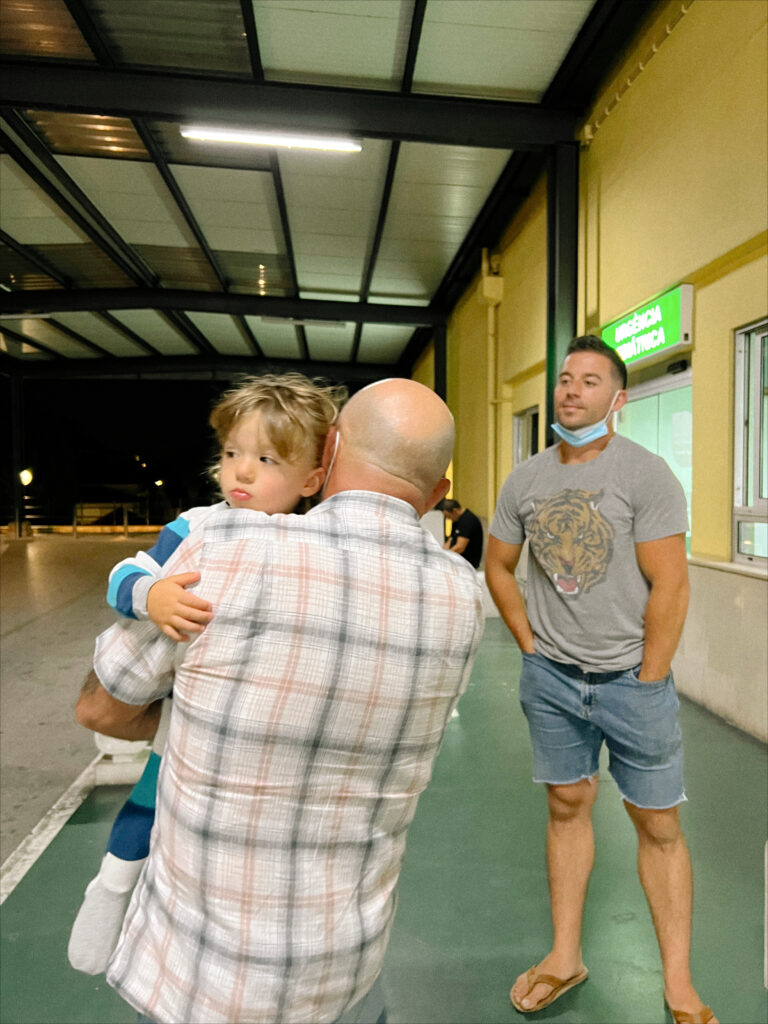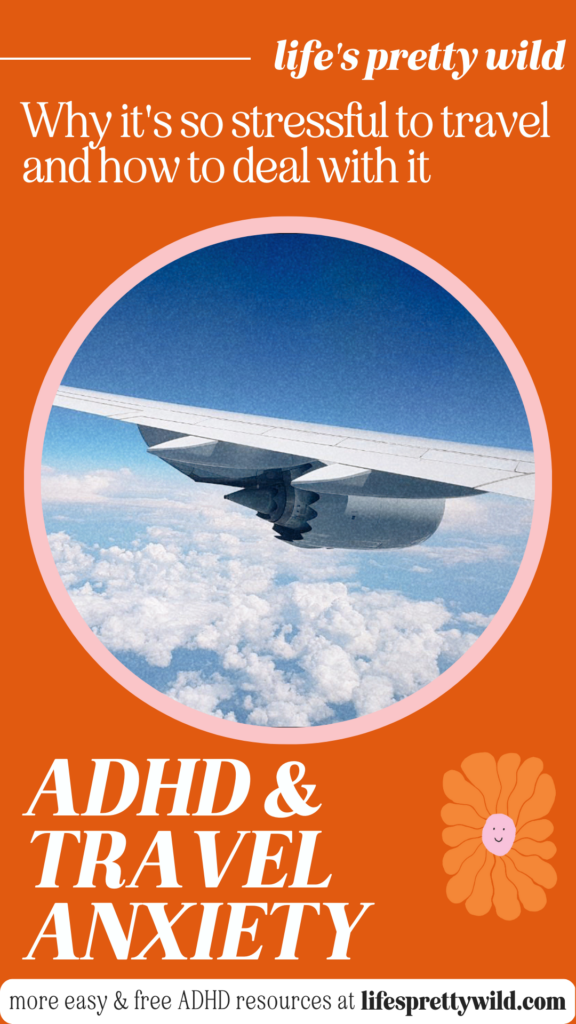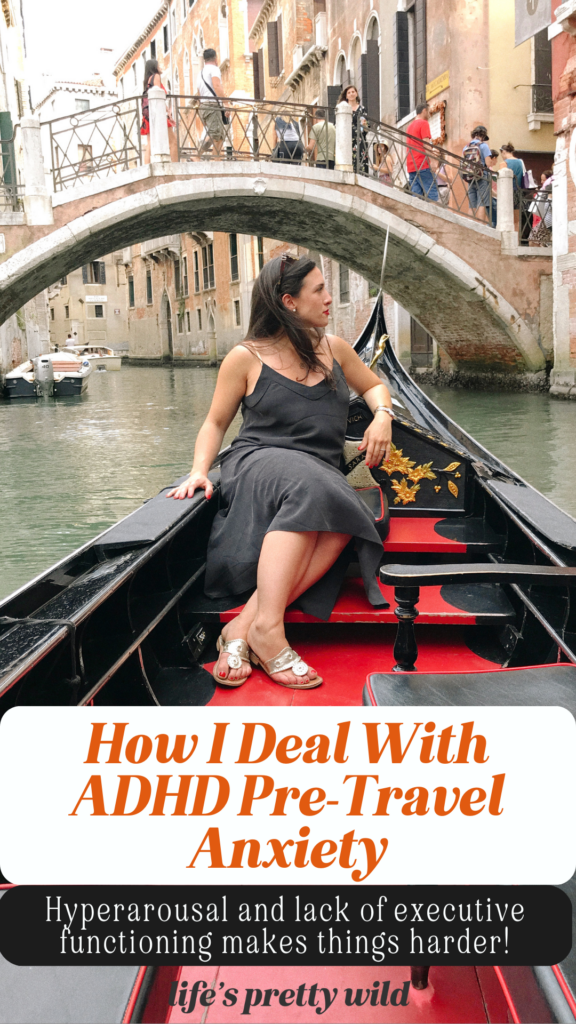Lots of people feel anxious before traveling; it can be nerve-wracking to leave home, even if you’re going on a much-needed vacation. When you have ADHD though, that anxiety can be magnified for two big reasons: emotional hyperarousal (ADHDers feel stronger emotions than the average person) and the lack of executive functioning needed to prepare for a trip (planning, packing, etc.). Am I an expert in anxiety? Definitely not. Am I a global travel expert? No, but I have visited my fair share of countries. Am I a mindfulness guru? Also no. I’m a thirty-something woman, mother, and ADHD coach sharing my practical tips and experience with pre-travel anxiety. Here’s how I deal with it.
1. Identify the anxiety trigger.
Emotions are incredibly important to the ADHD process – don’t underestimate the power of naming your trigger. It’s exponentially harder to address your pre-travel anxiety if you don’t know what exactly is stressing you out.
So many of us have become so out of touch with our intuition that we don’t even realize that we’re stressed. But our focus is off (even more than usual), or we’re sleeping poorly, or we’re snippy with our spouse or kids, or we’re forgetting things (again, even more than usual). If you have a trip coming up, these could all be signs of pre-travel anxiety.
If you’re stressed out and you’re not sure why, I came up with a list to help you identify potential triggers. I’m sharing my common fears and I also polled my Instagram audience to find out what stresses them out most pre-travel. Here’s what came up:
- Packing
- Flying/Driving
- Being away from home
- Food/food allergies
- The “what ifs”
I lumped a bunch of worries as “what ifs” because that’s what they all had in common; they were all hypothetical scenarios of what could potentially happen while traveling. Examples of “what ifs” are:
- What if the plane crashes?
- What if my flight is delayed?
- What if we hit traffic?
- What if there's something wrong with my rental car?
- What if I miss my connection?
- What if I forget something?
- What if I get hurt/injured in a foreign place?
- What if I need to go to the hospital?
- What if something happens to my home while I'm gone?
- (If traveling solo) What if something happens to my family?
These are all real and valid concerns for anyone, but for someone with ADHD, it has the potential to derail your routine for days, even weeks leading up to the trip. Keep reading tips 2-5 for how I deal with some of the specific “what if” scenarios above.
True story: We actually did end up in the emergency room (twice) while in Portugal in the summer of 2022 and ya know what, it was scary, but no scarier than if we had been at home. We survived! And it was actually thousands of dollars cheaper than if we had been in the US. So there's always a silver lining 😅.

2. Write a packing list.
A few weeks out from the trip, set a reminder on your phone or in your planner to start a packing list. (Set repeated reminders every day or every other day so you remember to do this). As you go about your day, take note of the things you use and add it to the list: toothbrush, toothpaste, medication, supplements, feminine hygiene products, shampoo, conditioner, etc. When you have a packing list in writing, it’s SO much easier and less stressful to pack. It’s super annoying and sometimes even really difficult to have to search for a store to buy the little things you forget at home. If traveling as a family, do this for your kids as well. Your spouse can take care of his or her own dang packing.
Once you’ve done this once, you’ll always have a packing list to refer to when you go on another trip. Because each kind of travel has slightly different packing requirements, you can even save it in a doc or notes app and label it “weekend trip,” “trip abroad,” “road trip,” “family trip,” “work trip,” or “solo trip,” so you know exactly what to bring no matter where you’re going. And if you happen to forget something, add it to the packing list so you remember it next time.
It can be helpful to look at examples of packing lists, too. Here are my go-to staples I bring with me when traveling:
- HYDRATION: stainless steel water bottle, travel filter, electrolytes
- SUPPLEMENTS: Organifi, Ion Gut (get a free travel bottle with this link), Vitamin C, liver, pill box
- SNACKS: grass-fed beef sticks, Kion bars are MY FAVE!, Rx bars, Hu gems, Simple Mills crackers, applesauce (if traveling with the kiddos), Mamma Chia prebiotic pouches
- CLEAN MAKEUP: Skin Twin, Dew Skin (tinted moisturizer with SPF), cream blush, lipstick, mascara, brow gel (if you need clean makeup, you can save a ton of money + overwhelm getting all of these as a set — no confusing trip to Sephora req’d 😆)
- SKINCARE: travel Countertime, deodorant, C serum, gua sha, toothpaste
- SUNCARE: sun hat, my very favorite sunscreen (if you don't love it, return for free)
- HAIR: curling wand, brush, shampoo/conditioner, dry shampoo (LIFESPRETTYWILD10 saves you $$)
- CLEANING: ya never know what kind of soap you’ll find at airports and public restrooms (or WON’T find 😅) so I bring this all-in-one hand serum + sanitizer and this travel soap. I’ve already used the soap several times, including washing the kids’ bottles with it! Bonus, it can treat clothing stains.
- PACKING: travel case set, wet bags for underwear and dirty clothes, lots of gorgeous dresses from Nuuly (I’ve found I spend WAY less money on clothes since switching to rentals and I love that it’s a more sustainable option)
- SLEEP: comfy sustainable sleep set, eye mask, amber reading light clip, blue light blocking glasses (I’ve been trying to be more conscious of avoiding artificial light past around bedtime)
- RANDOM: Label maker (for before the trip)

Nuuly makes it so much easier to avoid over-spending on clothes pre-trip!
3. Make mundane tasks more interesting.
Booking the rental car. Renting car seats. Taking the suitcases out from the basement/attic/storage. Ugh, I can sense your eyes glazing over from boredom. When you have ADHD, getting boring stuff done can be so darn difficult because our inconsistent interests and big emotions work against us. We have what’s called an “interest-based nervous system,” so rewards, importance, and consequences don’t always push us into action.
But what does spur us into action? Interest.
For example, when my husband and I traveled to Hawaii, I really had my heart set on driving a badass Jeep. So I looked up Pinterest images of jeeps to envision myself in one before heading to the car rental site. I kept that vision in my mind until I got to the booking confirmation page. For me, the idea of getting to pick and drive a cool car was enough to get my dopamine flowing and get the task done.
I was interested in driving a specific car and I knew that if I waited too long, they would most likely be sold out.

There is nothing interesting about renting car seats, so I rely on tip #4 for tasks like this one (outsourcing) or use the future self technique proposed by ADHD expert Tamara Rosier in her book “Your Brain Is Not Broken.”
The Future Self technique is simple: ask yourself, how would my future self feel about this decision? How would Wednesday night Ana feel about Tuesday night Ana getting a head start on packing? She would feel grateful and more able to get a good night’s sleep.
How would Wednesday night Ana feel if I procrastinated packing until the last minute? Stressed. Anxious. Fearful of forgetting something.
This is part visualization technique, part self-care. It reframes the way you look at consequences by making your future self either the victim or the beneficiary or your actions.
4. Outsource for reduced anxiety.
Want to travel but can’t bring yourself to do the tedious planning? Hire a travel agent! Don’t put off a well-deserved trip simply because you don’t have the motivation to plan one. Often the fee of a seasoned agent is well worth it because they have access to deals we don’t, and have so much experience booking that they know where to stay and where not to stay. They can literally do it all for you – minus the packing!
Fun fact: If you’re headed to Disney, a travel agent is totally free (if you stay at one of their resorts). They earn their commission directly from Disney so it’s free for you. One less thing off your plate.
Other ideas of what to outsource:
- A cleaning service so that you can come home to clean, tidy space. This is a luxury, for sure, but can be worth it if you worry about coming home to a giant mess.
- Easily hold mail delivery online with USPS – you don’t have to go to the post office to do it!
- Work/Business tasks. Worried about work while you’re gone? Hire a VA from Fiverr or Behance to take some things off your plate. It may even make you feel better about missing work if someone else is working for you while you’re on vacay.
If you’re in a partnership, outsource to your partner. That’s the whole point of being in a committed relationship. Don’t take on more than you can handle and have your future self pay for it. If you know you simply cannot bring yourself to do a certain task, ask your partner or travel buddy to do it. Ain’t nothing wrong with asking for help.
5. Calm pre-travel anxiety with journaling.
Emotional hyperarousal means ADHDers experience emotions much more intensely than their neurotypical peers. One thing that helps me tremendously is journaling. Writing down all of your feels has been shown to decrease anxiety by both eastern tradition and western research. I’ve heard – and I wholeheartedly agree with this – that journaling gives you access to your subconscious brain, especially if you give yourself some quiet, purposeful time to do it.
For me, I find that first thing in the morning or just before bed is the perfect time to journal. The morning can be a little rushed because I typically am anticipating everything I need to do that day, but the benefit to journaling within 15 minutes of waking up is that your mind is still in a dream-like state. Just before bed is also a great time to journal because it allows you to put your fears to “rest” before you get some shut-eye.
I’m going on a solo trip to a retreat in Mexico this week and I’m so anxious about it. My husband Ryan is fully supportive of me going but I’m feeling such a mix of emotions about leaving him solo with the kids for five days. Journaling about exactly what I’m anxious about has been really helpful. It also helps me see that the big things aren’t so big once I write them down.
On a related note, I created a planner and workbook designed specifically for ADHD brains and in it, I included several templates to address this kind of spiraling and thought distortion. It includes over 220 pages of neuroscience and psychology-backed exercises. My favorite templates for working through these “what if” scenarios are:
Div/Con Process: How to strike the perfect balance between divergent thinking (creative thinking, idea generation) and divergent thinking (getting things done, planning and prioritizing, executing).
Facing Finitude: How to create a strong “why” for your goals.
Busy Hands, Focused Mind: A strategy for calming yourself down when engaged in an unhelpful negative spiral.
Gamify Your To-Do List: How to turn your to-do list into a game and give our brains the dopamine they so badly crave.
Procrastination Killer: Use “future self” thinking to identify what is triggering the procrastination
Fixed Vs. Growth Mindset: How to identify limiting beliefs that are holding you back
Reframing Beliefs: How to reframe limiting beliefs into more expansive ones.
Reframe Thought Distortions: How to identify unhelpful thoughts skewed by our subconscious brain and reprogram them into a more helpful thought pattern.
Grab the planner here: Priority Planner for ADHD.

I hope these tips are helpful! Remember, your ADHD symptoms are much worse when you feel anxious, so give yourself more compassion instead of more harassment during these tricky scenarios. Happy travels!!!
Pin this for later:


Comments +